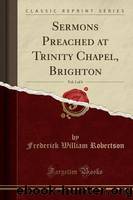Sermons Preached at Trinity Chapel, Brighton, Vol. 1 of 4 (Classic Reprint) by Frederick William Robertson

Author:Frederick William Robertson [Robertson, Frederick William]
Language: eng
Format: epub
Tags: Sermons, Church of England -- Sermons, English -- 19th century
ISBN: 9780243174355
Goodreads: 34049494
Publisher: Forgotten Books#PrB.rating#0.0
Published: 2019-02-13T00:00:00+00:00
And hence we understand the way in which Christianity was to work. It interferes indirectly and not directly with existing institutions. No doubt it will at length abolish war and slavery, but there is not one case where we find Christianity interfering with institutions, as such. Even when Onesimus ran away and came to Paul, the apostle sent him back to his master Philemon, not dissolving the connection between them. And then, as a consolation to the servant, he told him of a higher feelingâa feeling that would make him free, with the chain and shackle upon his arm. And so it was possible for the Christian then, as it is now, to be possessed of the highest liberty even under tyranny. It many times occurred that Christian men found themselves placed under an unjust and tyrannical government, and compelled to pay unjust taxes. The Son of Man showed his freedom not by refusing, but by paying them. His glorious liberty could do so without any feeling of degradation; obeying the laws, not because they were right, but because institutions are to be upheld with cordiality.
One thing in conclusion we have to observe. It is possible from all this to draw a most inaccurate conclusion. Some men have spoken of Christianity as if it was entirely indifferent about liberty and all public questionsâas if with such things as these Christianity did not concern itself at all. This indifference is not to be found in the Apostle Paul. While he asserts that inward liberty is the only true liberty, he still goes on to say, âIf thou mayst be free use it rather.â For he well knew that although it was possible for a man to be a high and lofty Christian even though he were a slave, yet it was not probable that he would be so. Outward institutions are necessary partly to make a perfect Christian character; and thus Christianity works from what is internal to what is external. It gave to the slave the feeling of his dignity as a man, at the same time it gave to the Christian master a new view of his relation to his slave, and taught him to regard him ânot now as a servant, but above a servant, a brother beloved.â And so by degrees slavery passed into freed servitude, and freed servitude, under God's blessing, may pass into something else.
There are two mistakes which are often made upon this subject; one is, the error of supposing that outward institutions are unnecessary for the formation of character, and the other, that of supposing that they are all that is required to form the human soul. If we understand rightly the duty of a Christian man, it is this: to make his brethren free inwardly and outwardly; first inwardly, so that they may become masters of themselves, rulers of their passions, having the power of self-rule and self-control; and then outwardly, so that there may be every power and opportunity of developing
Download
This site does not store any files on its server. We only index and link to content provided by other sites. Please contact the content providers to delete copyright contents if any and email us, we'll remove relevant links or contents immediately.
Kathy Andrews Collection by Kathy Andrews(10506)
The remains of the day by Kazuo Ishiguro(7542)
Spare by Prince Harry The Duke of Sussex(4188)
Paper Towns by Green John(4163)
The Body: A Guide for Occupants by Bill Bryson(3789)
Be in a Treehouse by Pete Nelson(3206)
Harry Potter and the Goblet Of Fire by J.K. Rowling(3024)
Goodbye Paradise(2949)
Never by Ken Follett(2872)
Into Thin Air by Jon Krakauer(2695)
The Remains of the Day by Kazuo Ishiguro(2614)
The Genius of Japanese Carpentry by Azby Brown(2602)
The Cellar by Natasha Preston(2592)
Drawing Shortcuts: Developing Quick Drawing Skills Using Today's Technology by Leggitt Jim(2528)
120 Days of Sodom by Marquis de Sade(2428)
Architecture 101 by Nicole Bridge(2348)
The Man Who Died Twice by Richard Osman(2289)
Machine Learning at Scale with H2O by Gregory Keys | David Whiting(2264)
Fairy Tale by Stephen King(2058)
